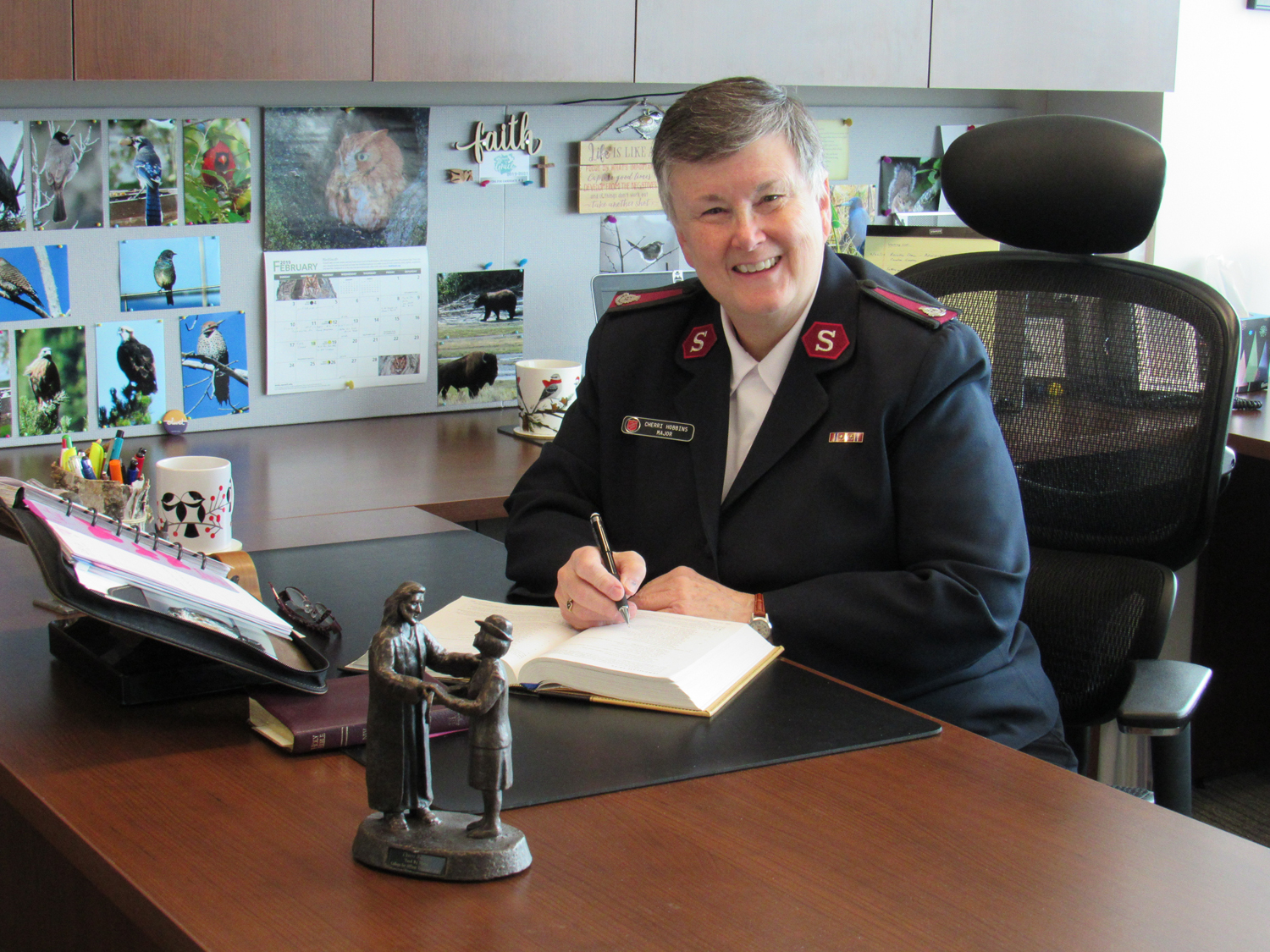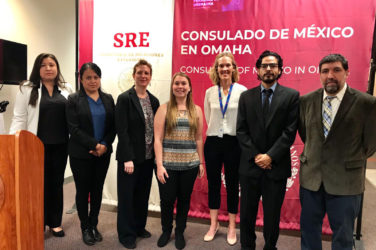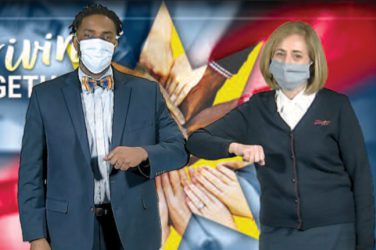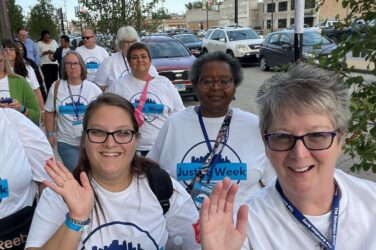Undergoing the first significant change in 30 years, The Salvation Army Continuing Education Program (SACEP) is better than ever. With a customizable agenda of classes, it allows officers to participate in more focused study to meet their interests and needs. Its restructure also promotes further academic achievement, providing personal validation, enabling better service and leadership, and garnering community respect.
We talked with Major Cherri Hobbins, territorial officer resource development secretary, and Dr. Robert Simpson, dean of the School of Graduate and Continuing Studies at Olivet Nazarene University (ONU), to understand why the time was right for this overhaul, what it took to accomplish, how the redesigned program will work and its key benefits for officers. Here’s what we found out.
What precipitated this change?
Hobbins: Coming into this appointment in July 2017 and having completed work on my master’s, I realized education and its delivery have changed exponentially in recent years for adult learners. SACEP was clearly better than the program that preceded it, but it hadn’t kept pace with the times. It wasn’t all it could be.
Simpson: And at the university we’d just undergone an extensive academic review of all courses which brought SACEP into sharp focus. I also was new to my job at that time and felt we could offer far more than a general practical ministries degree.
Hobbins: We came with fresh eyes, were open tochange and thinking along the same lines. We wanted to create something that would “sing” for people, something that would fully engage them and encourage them to go further.
It seems like divine timing, all things working together. Is this how you see it?
Simpson: Yes!
Hobbins: Absolutely.
This has been in the works for a year and a half. What was the process?
Hobbins: Well, first we worked together on what this new program should look like in order to be successful. Then we fleshed out the details over time and created a proposal that was reviewed, refined and approved by the territorial education committee.
Simpson: And at the university the plan was vetted at every level.
Hobbins: Then it was presented to territorial leadership.
Simpson: Their support has been significant. They’ve understood the needs of officers today and how this is relevant. To me, they’re recognizing it is stewardship in helping officers succeed. They’re looking at how to invest in officers so they can engage in their communities better.
So how is the new SACEP different?
Hobbins: The new program offers variety and the ability to really design your own program. It picks up on the individual “spark”—what you’re interested in or what you feel you really need in order to be successful. It goes beyond the surface of subjects. For instance, one of the things I’ve discovered is a real need of new officers for more business knowledge, and this allows a deeper dive into business practices.
Simpson: You can bundle courses together. For instance, some courses in business, some in human services and some in leadership. They range from Financial Accounting for Managers and Human Resource Management, to Leadership and Ethics. There are 12 courses in all with a concentration in business. And we’ll constantly be adding more course options to fit needs and interests.
Another big change is that previously SACEP was taught by qualified officers vetted by ONU, but now the courses are taught by ONU professors, practicing professionals who are leaders in their fields.
This sounds excellent, but how do we keep The Salvation Army distinctive?
Hobbins: Where we felt strongly about Salvation Army distinctives, language has been incorporated to build bridges.
Simpson: Every course at Olivet has a strong Christian, “Kingdom” perspective, and all faculty members have to be attuned with that evangelical perspective. So, we’re very much in sync with the Army. And everything learned is contextualized to an Army setting. Students are not only learning theories but how they apply to their organization.
Hobbins: The SACEP distinctive of officers in their first five years connecting with their sessionmates face-to-face will remain, only as a short retreat—just three days in May—and will focus on personal and professional development, not academics. There will still be a learning component, but it’s about spiritual formation.
Could you elaborate?
Hobbins: Sure, it will most likely include united worship, structured opportunities for spiritual formation, breakout meetings by their length of service led by a pastoral care officer, unstructured time for fellowship and corporate instruction on a topic related to officers.
There will be an emphasis on officers sharing their experiences; reacquainting with sessionmates who can “speak into” your experience from their own.
The retreat will take the place of the fifth course traditionally audited by officers, so attendance is required by all officers during their first five years. At these retreats, interviews of first- and fifth-year officers will also be conducted by the Secretary for Personnel.
How will this online learning work and what are some of the advantages?
Hobbins: One of the best things is the flexibility to fit learning into your schedule. Online learning is easier for officers with demanding, busy schedules. Now you can study year-round, at your own pace, without having to leave your appointment twice a year for a week at a time. It’s especially convenient for officers with small children.
Also, you can start and finish a degree anywhere in the world, no matter where you get appointed, and you can do coursework during other commitments if you have free time, like an evening at camp or officers’ councils.
Simpson: Courses have start times throughout the year from which to choose. It’s asynchronous learning, meaning that professors set curriculum, give assignments to be completed within a specified time-frame and guide students with questions on discussion boards. This requires students to engage; you can’t be passive.
There are three elements that make this type of learning so successful. First, the professor is present; they must touch base with students five days a week through this medium. And students must be present—online in these discussion boards—at least two days a week. Third is the intentional cognitive learning. It’s proven that the learning that happens this way is deep and rich!
Hobbins: Another point is that officers won’t be interacting only with each other in the learning process.
Simpson: Right, they will be entering the ONU classroom and be exposed to a cross-pollination of ideas. They’ll be hearing and learning what’s working for others.
Hobbins: That’s really valuable.
Is there any preparation needed for the online learning?
Simpson: To make sure they get the most out of this experience, each officer must take a short introduction to online learning.
Hobbins: We think most will be comfortable with learning this way because of how we use technology in our everyday lives now. It’s not a big stretch.
Does the new program set officers up better to go on and achieve more degrees?
Hobbins: With the old practical ministries degree, we found that officers finished the mandated coursework, but it didn’t always meet their specific needs or spur them on to going further in their education. We think the new program will. They’re still required to finish four courses in five years but, given the new online approach, it can be accomplished in as little as two years! With all the SACEP courses fitting into specific degrees, when they finish the required courses, they are not very far away from obtaining a degree.
Simpson: They can go on and obtain a bachelor’s degree in business administration, human services, practical ministries, or multi-disciplinary studies; or a master’s in business administration, ministry, organizational leadership for mission-driven organizations, human services or various ministry degrees. Students not ready to complete a degree can complete a certificate program in the areas of leadership, nonprofit management, coaching, intercultural studies and others, each for academic credit.
Each officer has an advisory team which will walk through a personal learning plan of how they can accomplish this. We’re very much about student success. We’re about providing opportunities.
Hobbins: Yes, we’re not forcing anything, but rather creating opportunities, enabling officers to see what they can achieve and that it’s all very attainable.
For more information, visit salarmycentral.org and click on officer resource and development department.





